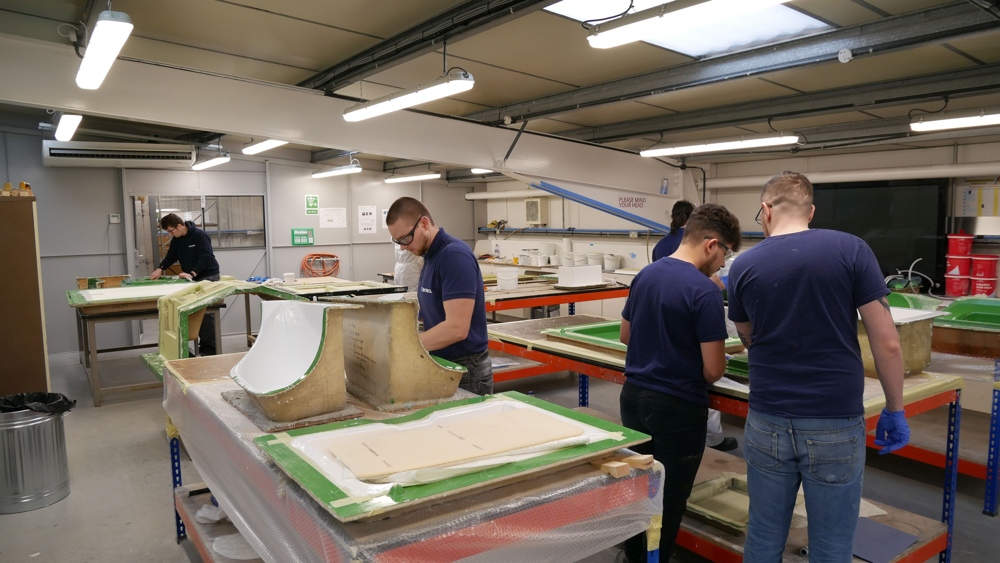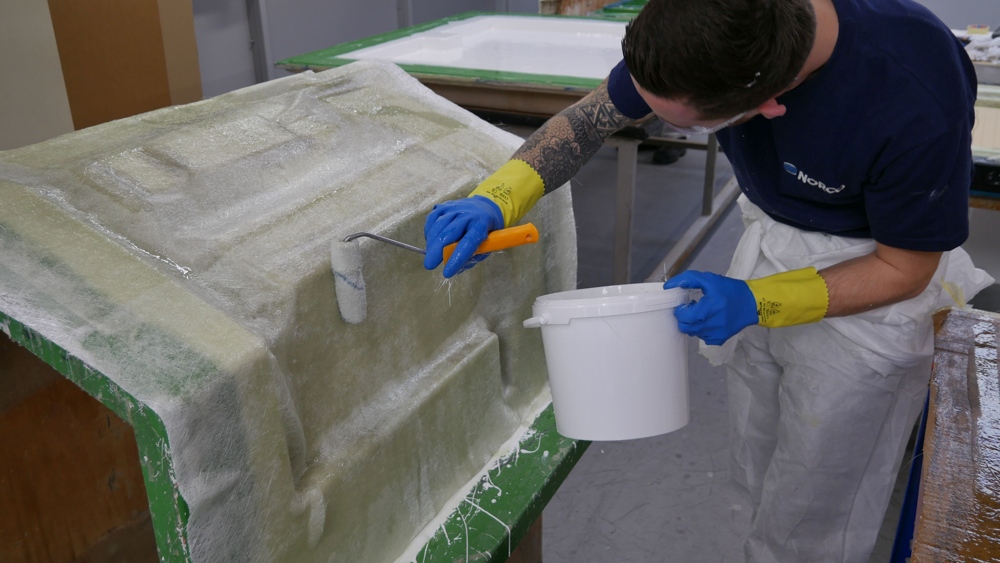Who says engineering can’t be fun?

Norco began 2019 with the opening of a brand-new training centre to offer hands-on training for all new apprentices working at the company, Mike Richardson hears about the exciting progress being made by the purpose-built facility.
Due to the current shortage of skilled workers in the composite manufacturing sector, Dorset-based composite manufacturer, Norco has taken the initiative to set-up its own training centre, enabling it to produce skilled personnel to its high standard and move staff around the company, as and when required.
“Norco’s training programme is a three-year hands-on course, beginning with six months in a classroom environment learning the basics of GRP hand lay-up, GRP finishing, infusion and prepreg,” begins Norco’s training centre manager, Paul Sproston. “The students are taught the basic skills in these four disciplines over the first six months before they move into the main factory to carry on their training in a production environment. Allowances are made for speed and quality within the first few weeks when they move into the main factory, until their confidence has grown.
“They will then complete an NVQ in Composite Engineering Level 2 and 3 and a BTECH diploma in Composite Engineering Level 3 in conjunction with Yeovil College over the three-year apprenticeship. The students spend approximately 90% on the practical, with 10% on theory during their level 2 NVQ qualification. This will change with the start of the level 3 NVQ and BTEC to 80% and 20% respectively, where they will then spend every Friday in the classroom with tutors from Yeovil College.”
It’s all about image
I’m interested to know whether Sproston feels that the UK composites sector struggles with an image problem in that it is seen as a ‘dirty’ career, and not as fulfilling as other sectors like finance, working in the media and games software programming. Who says that engineering can’t be fun?
“I truly believe that this is a problem. As the industry grows and new materials and processes are created, the traditional persona of glass-reinforced plastics manufacturing needs to change. Those composite manufacturing companies looking to recruit need to project with an updated marketing plan and showcase how the process isn’t as dirty as it used to be - with infusion and prepreg processes becoming the way forward.
“The general consensus of working in composites is that it is a messy, sticky job, so the younger generation are reluctant to start a career in the industry. A ‘re-branding’ is necessary to encourage people to look at composites as a possible career choice.”

So, is the Government doing enough to get more involved in helping SMEs with their training needs, and are its apprenticeship schemes really any good? Are more employers creating their own training schools due to their dissatisfaction?
“With the Government recently changing the way companies can use the Apprenticeship Levy, I’d say no. The Register of Apprenticeship Training Providers (RoATP) is an application form that now needs to be completed by all companies that are eligible to use the Levy fund. The form must be approved before any company can draw on the Levy fund.
“Norco’s training plan was designed - not out of dissatisfaction from what was available - but to benefit the needs of Norco as a business,” Sproston says. “We found that what was available included elements which had no relevance to Norco, so the decision was taken to design a programme that fitted Norco’s needs. It also gives the trainees skills in the composite sector that if the trainee was to leave, they could put to good use what they had learned at Norco in other composites companies.”
Bridging the skills gap
Much has been said about the chronic skills gap for UK composites and engineering industries that employ composites in manufacture, from F1 to aerospace, and medical to defence, so what’s Sproston take on this debate?
“It is not a shortage of skilled people, but rather the attitude of the individual. A composite laminator that works in the F1 or aerospace sectors can earn very good money. Companies that produce high turnaround, wet-layup mouldings cannot compete with the level of wages that someone working in F1 sector demands, so the ‘skilled’ staff tend to stay away from wet-layup companies.”
But is enough being done to persuade school-leavers with good hands-on practical skills to take up composites and engineering apprenticeships?
“Yes, I believe so. We recently attended an open evening at Yeovil College to demonstrate what we do as a company to potential apprentices. The opportunity for companies is out there; it is up to them to use these events to showcase what they can offer.”
In terms of the kinds of personal attributes youngsters can gain from undergoing this kind of training comprising mathematical abilities; a good hands-on approach; keen and willing to learn, Sproston feels that a sense of pride is an important attribute. “Making and completing a product - from raw materials to finished part - can have a very positive effect on someone.”

I wonder whether youngsters are discouraged from entering the composite engineering industry because they are not academically able? This limits the potential pool of recruits, particularly those with a practical bias who may develop later to become academically capable enough to operate effectively in the more cognitive areas. Sproston says that Norco’s training plan is created to allow any possible starter to join the programme.
“If they aren’t at the academic level to do the required course work, they are offered a position at the local college to attend night school to get them up to the required level. Once they have completed this, they can enrol into the NVQ/BTEC programme.”
Life’s great adventure?
Ultimately, the march of technology and changing social and parental habits have combined to seriously affect a child’s interest in simple engineering-related pastimes like making an Airfix model kit, a go-kart, flying a homemade kite or building a tree house. I would suggest that kids these days seem much more content to stay indoors, playing on their Xbox computer or smart phone than having ‘learning’ adventures on the playing fields and in the shed, therefore they are less likely to develop practical skills.
“I couldn’t agree more,” Sproston concludes. “It seems that today’s younger generation are more concerned with what’s going on with social media and playing on gaming consoles than going out and having a ‘proper’ childhood. This will obviously have an effect on their transition to work life, as skills they should have learned as a child are missing.”









